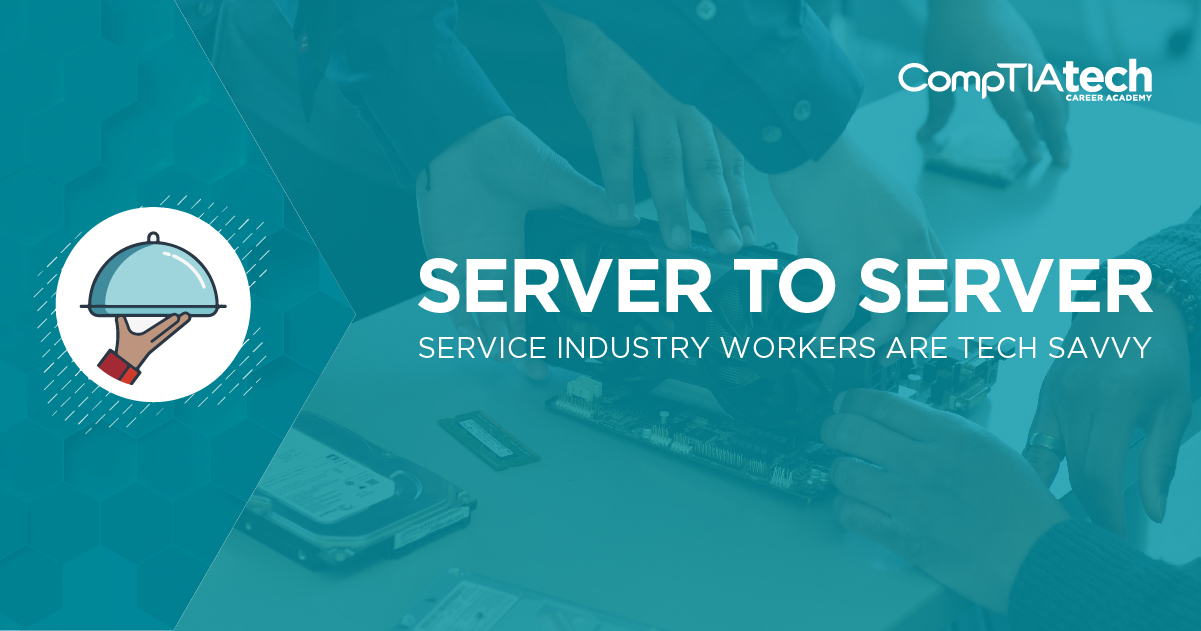 In a series of blog posts, CompTIA explains why service-industry workers make ideal candidates for entry-level positions in information technology. In this fourth article, we address the question potential technologists ask, “Will I even be able to perform IT work?”
In a series of blog posts, CompTIA explains why service-industry workers make ideal candidates for entry-level positions in information technology. In this fourth article, we address the question potential technologists ask, “Will I even be able to perform IT work?”
Keith VanDerMolen waited tables for seven years before poor wages and long hours made him look elsewhere. Today, he works as an IT asset manager for Echo, a transportation management solutions provider.
“Within a year in IT, I doubled the salary I made as a waiter,” he said. “I have a more traditional schedule now, and I have been saving money so I can buy a house.”
Tending bar for 10 years, Matthew Kerr worked at two different taprooms just to cobble together enough hours. Today, he works as an IT support technician for the City of Chanhassen, earning a family-sustaining wage and generous health and retirement benefits.
“Tech didn’t buy my house or have my baby — but I can’t imagine being able to accomplish either one without it,” Kerr said. “It’s given me the ability to support my family and the freedom to do what I want in my life.”
Truth: IT is easier to break into than you’d think, especially if you have service-industry experience
When retail, hospitality and service workers first consider changing careers to information technology, the first question they tend to ask is: Will I even be able to perform IT work?
The answer is a resounding yes, said Adam Turner
That’s because service-industry workers have more tech knowledge than they realize, thanks to the tools of their trades.
Inventory or stock management, scheduling, orders for the kitchen or bar, orders from third-party delivery services, self check-out kiosks — service-industry workers use technology for all of these functions daily.
“Technology is not some mysterious or scary entity that must be kept away from mere mortals,” Turner said. “In fact, 96 percent of Americans casually carry technology in our pockets or handbags. If you can use a smartphone, you can make a career in IT.”
Tech skills can be acquired — if you’re willing to learn. In a Harvard Business Review article, author Erika Andersen says people who strive to continuously learn have a competitive advantage over people who don’t.
“They truly want to understand and master new skills. They see themselves clearly,” she writes. “They constantly think of and ask good questions. And they tolerate their own mistakes as they move up the learning curve.”
Turner said that while he could list the many technical skills people pick up during CompTIA Tech Career Academy training, he wouldn’t do it here.
“Honestly, if someone isn’t familiar with IT nomenclature, he or she might be discouraged by the list because it contains terms that they don’t know yet,” Turner said. “And I said ‘yet’ deliberately, because those terms can be learned. I would assure any service-industry worker that if you want to learn tech, you can learn tech.”
Kerr agreed with Turner’s assessment.
“The program taught me the fundamentals of working in technology,” he said. “Whether it was troubleshooting problems, training large groups of people, or dealing with computer issues I’ve never seen before, I was prepared for all of it.”
Service industry workers uniquely poised to switch to technology
“I knew I wanted more in life than working as a waiter,” VanDerMolen said. “I just didn’t know how to get there.”
And Kerr said he encouraged waiters, bartenders, clerks and others in the service industry not to discount their ability to launch a tech career.
“Don’t think that you know too little to be able to get involved with IT,” he said. “If you’re willing to learn and you’re willing to put in the time, then you can succeed.”
So why aren’t more service workers making the switch? What is holding people back?
Turner thinks more people would pursue a tech career if they understood how quickly that transition can occur.
“People assume transitioning into a tech career takes more time and money than they have,” Turner said. “But tech training and the transition into a new career actually is easier, cheaper and faster than they think. And service-industry skills don’t just transfer to IT, they actually are desired within IT. The tech industry is clamoring for them.”
If you’d like to learn more about switching careers, check out CompTIA's microsite on careers in IT.

